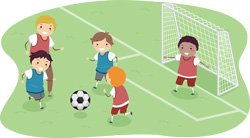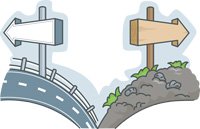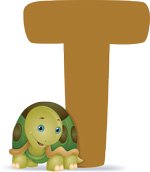Later vs. Latter
What is the difference?
Learning English is not always easy. One thing that often makes it hard is all of the pairs of words that look and sound so much alike, and sometimes have very similar meanings. One such pair of words that we will be looking at in this lesson is later and latter.
It is important to make sure you know which is which when trying to communicate in English. One word means the second of two things, while the other can be a way to say goodbye to someone. You wouldn't want to say goodbye and end a conversation without meaning to!

Let's look at some examples to help you learn the distinction.
Click Here for Step-by-Step Rules, Stories and Exercises to Practice All English Tenses
Later
The first word to know is later, which is both an adverb and an adjective.
The most common definition of later means a time following or after a given time.Some time in the future, rather than a sooner identified time. Let's go over some examples to see how you can use later in a sentence.
Examples:
- I do not feel like cooking right now, so I will do it later. (I do not feel like cooking at the present time, so I will do it at a future time.)

- Later today there will be a soccer game on television and I want to see it. (At a future time today there will be a soccer game on television that I want to see.)

- Chuck needs to schedule a later appointment because he is running late. (Chuck needs to schedule an appointment at a time in the future, because he is running late.)

- Bill is giving Chris a ride home from work later on. (Bill is giving Chris a ride home from work at some point in the future.)

- Sooner or later, everyone catches a cold. (At some point in the near future or in the more distant future, everyone catches a cold.)

Later can also be used informally as a way to say goodbye. Let's see some examples of this definition used in sentences.
Examples:
- I have to go now, but I will see you later. (I have to go now, goodbye.)

- Benjamin says "later" to his friends as he walks out of the room. (Benjamin says goodbye to his friends as he walks out of the room.)

Latter
The second word that we will go over in this lesson is latter, which is an adjective. There are two ways that you can use latter in a sentence.
The first meaning of latter is something that is closer to the end of something than to the beginning of it. Let's go over some examples of latter being used in this way.
Examples:
- The latter part of the movie was my favorite. (The part of the movie closer to the end was my favorite.)

- The Vietnam War occurred in the latter part of the 20th century. (The Vietnam war occurred closer to the end of the 20th century than to the beginning.)

- It doesn't start to get cold until the latter hours of the day. (It doesn't start to get cold until the hours of the day closer to its end.)

Another way that you can use the word latter is to identify the second in a list of two things. Now for a few examples of latter used in this way.
Examples:
- Between the two choices, I would rather have the latter than the former. (Between the two choices, I would rather have the second than the first.)

- Ellen has a cat and a dog, but she prefers the latter because it is nicer. (Ellen has a cat and a dog, but she prefers the second of the two, the dog, because it is nicer.)

- Bill is angry with Ted, because the latter stole the former's hat. (Bill is angry with Ted, because Ted stole Bill's hat.)

Collocations
There are certain words that are often said or written along with both later and latter. One example for later is the phrase "later on," which is just another way to say later and means the same thing.
For example: We can talk about business later on, but let's eat lunch right now. (We can talk about business at some point in the future, but let's eat lunch at this time.)

Another collocation for later is "sooner or later," which means that something is definitely going to happen eventually, either in the near future or more distant future.
For example: He will have to go to sleep sooner or later. (He will eventually fall asleep, whether it is in the near or distant future.)

For latter, the word is usually written and spoken with the word "former" as its opposite. Latter means the second of two things and "former" means the first.
For example: The latter of the two options is better than the former. (The second of the two options is better than the first.)

More Tips
Now that you know the common definitions of both later and latter and how to use them both in a sentence, it will be easy to put them to use!
The two words look and sound very similar though, so it can still be hard to remember which one is which even if you know the definitions. There is an easy way to remember though.
If you are having trouble, all you need to remember is that there is only one "t" in later, but two in latter, and latter means the second of two things. So if you see two "t's" you'll know that there are two things in your list and you want the second, or the latter.
Now you should have no problem knowing which is which!

A Story to Practice Later vs. Latter
Rita has an appointment with her doctor later today. Before she goes, she needs to buy groceries. She does not know if she should go to the Walmart or the little store near her house. She chooses the latter even though it costs more. Rita sees her friend looking at fruits and says hello. Her friend cannot talk long because she is has to be somewhere later and she is already late.
"See you later," she says to Rita. Rita knows her friend from the latter part of college when she was almost done. She doesn't see her friend often but she knows that sooner or later they will run into each other again. Rita sees two pineapples on a table and goes to get one. She picks both up and sees that the former is too ripe, so she buys the latter instead.
Rita always goes to the doctor in the latter part of the evening, when there is less traffic. If she makes an appointment any later, the doctor's office will be closed. The doctor checks her eyes and ears. He says the latter are fine but the former are not, so she needs to get glasses. She leaves and he says "later!"

Quiz
Answer the following 10 questions and then check your answers. Each question is worth 10 points.
- The _____ (latter/later) half of the day is for relaxing, not working.
- _____ (Latter/Later) today I am going to the gym to work out.
- Betty is leaving for work so she says she will see us _____ (latter/later).
- If I have to choose between the two, I will pick the _____ (latter/later) over the former.
- The president was very well liked until the _____ (latter/later) part of his term.
- Jeff wants to meet Jane now instead of _____ (latter/later) because he will be busy.
- _____ (latter/later) on there will be more places open that you can go to.
- I am going to be _____ (latter/later) than him to the meeting.
- The _____ (latter/later) half of the song is much faster.
- Sooner or _____ (latter/later) it is going to rain.
Answer Key
1. latter | 2. Later | 3.Later | 4.latter | 5. latter | 6. later | 7. Later | 8.later | 9. latter | 10. later
Get Updates, Special Offers, and English Resources
Download your FREE GIFT (the first two chapters of
English Short Stories Book and Workbook)
as soon as you join!

By submitting your email, you consent to receiving updates and newsletters from us and to the sharing of your personal data with third parties for the purposes of sending you communications. We will not spam you. You can unsubscribe at any time. For more information, please see our privacy policy.





